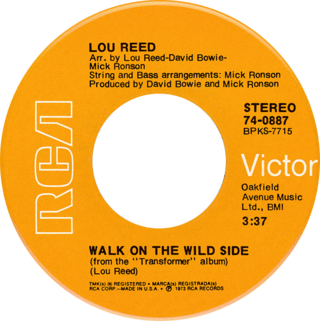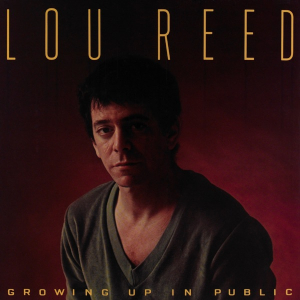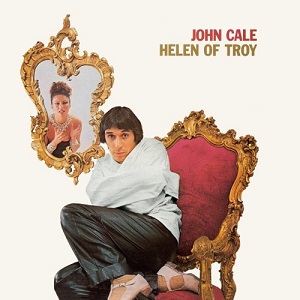
The Heart of Saturday Night is the second studio album by singer and songwriter Tom Waits, released on October 15, 1974, on Asylum Records. The title song was written as a tribute to Jack Kerouac. The album marks the start of a decade-long collaboration between Waits and Bones Howe, who produced and engineered all Waits' recordings until the artist left Asylum.

Transformer is the second solo studio album by American recording artist Lou Reed. Produced by David Bowie and Mick Ronson, the album was released on November 8, 1972 by RCA Records. It is considered an influential landmark of the glam rock genre, anchored by Reed's most successful single, "Walk on the Wild Side", which touched on controversial topics of sexual orientation, gender identity, prostitution and drug use. Although Reed's self-titled debut solo album had been unsuccessful, Bowie had been an early fan of Reed's former band The Velvet Underground and used his fame to promote Reed, who had not yet achieved mainstream success.

Absolutely Live is the first live album by the American rock band the Doors, released on July 20, 1970, by Elektra Records. The double album features songs recorded at concerts held in 1969 and 1970 in several U.S. cities. It includes the first full release of the performance piece "Celebration of the Lizard" and several other tracks that had not previously appeared on any official Doors release. The album peaked at number eight on the Billboard 200 in September 1970.

"Walk on the Wild Side" is a song by American rock musician Lou Reed from his second solo studio album, Transformer (1972). It was produced by David Bowie and Mick Ronson and released as a double A-side with "Perfect Day". Known as a counterculture anthem, the song received wide radio coverage and became Reed's biggest hit and signature song while touching on topics considered taboo at the time, such as transgender people, drugs, male prostitution, and oral sex.

Street Hassle is the eighth solo studio album by American rock musician Lou Reed, released in February 1978 by Arista Records. Richard Robinson and Reed produced the album. It is the first commercially released pop album to employ binaural recording technology. Street Hassle combines live concert tapes and studio recordings.

Lou Reed is the debut solo studio album by American rock musician Lou Reed, released in May 1972 by RCA Records, two years after he left the Velvet Underground. It was produced by Richard Robinson and Reed and features London session musicians as Reed's backing band, two of whom, Rick Wakeman and Steve Howe, were from the British progressive rock band Yes. Wakeman recalled that during the recording sessions, "the lights had to be out so nobody could see." The album was recorded at Morgan Studios in London, between December 1971 and January 1972.

We're an American Band is the seventh studio album by American hard rock band Grand Funk Railroad, credited as Grand Funk. The album was released by Capitol Records on July 15, 1973, and was certified gold by the RIAA a little over a month after its release. Two singles were released from the album. The title track was the first single from the album released on July 2, 1973 and the second, "Walk Like a Man", was released on October 29, 1973. Both were sung by drummer Don Brewer. There was also an addition to the band's membership with this release - Craig Frost - who played the organ, clavinet and Moog. Prior to We're an American Band being released, Grand Funk Railroad had been a power trio. Craig was credited as an additional musician on Phoenix, which was released the previous year.

Blondie is the debut studio album by American rock band Blondie, released in December 1976 by Private Stock Records.

Sally Can't Dance is the fourth solo studio album by American rock musician Lou Reed, released in September 1974 by RCA Records. Steve Katz and Reed produced the album. It remains Reed's highest-charting album in the United States, having peaked at #10 during a 14-week stay on the Billboard 200 album chart in October 1974. It is also the first solo Lou Reed album not to feature any songs originally recorded by Reed's earlier band, the Velvet Underground, as well as the first of Reed's solo studio albums to be recorded in the United States. The album art was designed by noted Fillmore and Broadway poster artist David Edward Byrd and was one of the few album covers he ever designed.

Growing Up in Public is the tenth solo studio album by American rock musician Lou Reed, released in April 1980 by Arista Records.

New Sensations is the thirteenth solo studio album by American rock musician Lou Reed, released in April 1984 by RCA Records. John Jansen and Reed produced the album. New Sensations peaked at No. 56 on the U.S. Billboard 200 and at No. 92 on the UK Albums Chart. This marked the first time that Reed charted within the US Top 100 since his eighth solo studio album Street Hassle (1978), and the first time that Reed had charted in the UK since his sixth solo studio album Coney Island Baby (1976). Three singles were released from the album: "I Love You, Suzanne", "My Red Joystick" and "High in the City", with "I Love You, Suzanne" being the only single to chart, peaking at No. 78 on the UK Singles Chart. The music video for "I Love You, Suzanne" did, however, receive light rotation on MTV.

Rock 'n' Roll Animal is a live album by American musician Lou Reed, released in February 1974 by RCA Records. In its original form, it features five songs, four of which were initially recorded by The Velvet Underground. Reed's band included Pentti Glan (drums), Prakash John (bass), Ray Colcord (keyboards), and Dick Wagner and Steve Hunter (guitars).

Magic and Loss is the sixteenth solo studio album by American rock musician Lou Reed, released on January 14, 1992, by Sire Records. A concept album, it was Reed's highest-charting album on the UK Albums Chart, peaking at No. 6.

Mistrial is the fourteenth solo studio album by American rock musician Lou Reed, released in April 1986 by RCA Records two years after his previous studio album, New Sensations (1984). Fernando Saunders and Reed produced the album.

Legendary Hearts is the twelfth solo studio album by American rock musician Lou Reed, released in March 1983 by RCA Records. Reed produced the album, and dedicated it to his then-wife, Sylvia, who was credited with the cover concept. Due to tensions with Reed, most of Robert Quine's guitar parts were mixed down or removed entirely.

The London Chuck Berry Sessions is the sixteenth studio album by Chuck Berry, and consists of studio recordings and live recordings released by Chess Records in October 1972 as LP record, 8 track cartridge and audio cassette. Side one of the album consists of studio recordings, engineered by Geoff Calver; side two features three live performances recorded by the Pye Mobile Unit, engineered by Alan Perkins, on February 3, 1972, at the Lanchester Arts Festival in Coventry, England. At the end of the live section, the recording includes the sounds of festival management trying in vain to get the audience to leave so that the next performers, Pink Floyd, can take the stage; the crowd begins chanting "We want Chuck!". His backing band for that concert included Onnie McIntyre (guitar), Robbie McIntosh (drums), Nic Potter (bass), and Dave Kaffinetti (piano). Both McIntosh and McIntyre would later form The Average White Band. The studio recordings included pianist Ian McLagan and drummer Kenney Jones from the bands the Small Faces and Faces.

Rock and Roll Diary: 1967–1980 is a compilation album by Lou Reed. It was released by Arista Records in 1980 as a double album split between tracks by the Velvet Underground and tracks by Reed, attempting to demonstrate the arc of his songwriting over the first fifteen years of his career.

Helen of Troy is the sixth solo studio album by the Welsh rock musician John Cale, released in November 1975. It was the last of his three studio albums for Island Records.

The Very Best of Dusty Springfield is a compilation album by Dusty Springfield, released by Mercury Records on 21 April 1998.


















